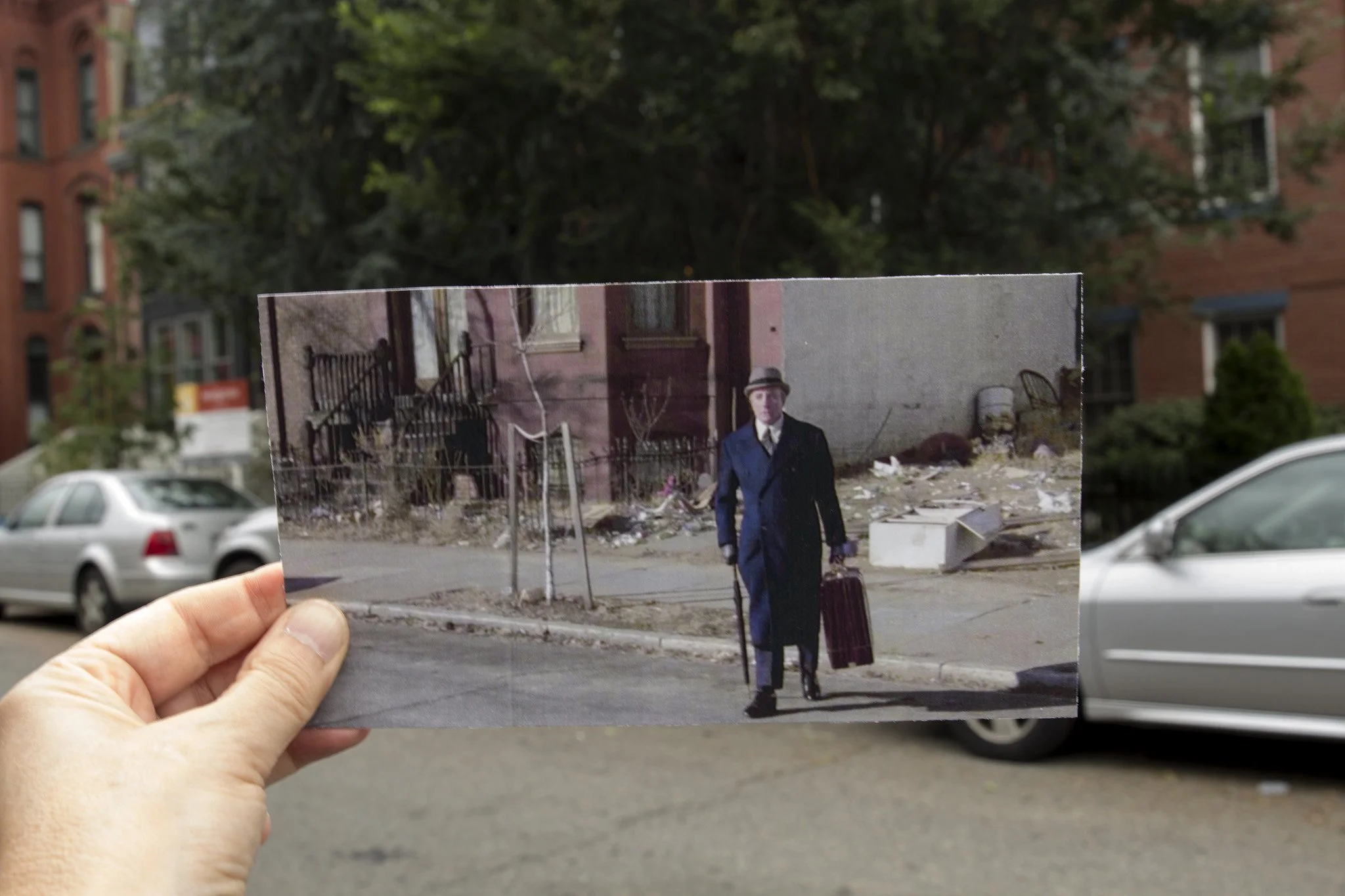Creating from a place of not knowing: “Could Nature be the CEO?”
Chance the gardener in the 1979 film ‘Being There’. Image credit: Lorie Shaull
Before we get too deep into the practicalities of Nature On The Board, I think it’s important to say that neither Anne nor I are experts in, nor did we have any real experience of, any of the following:
The Rights of Nature
Environmental Law
Corporate Law
Board Dynamics
Corporate Structures
Stakeholder Models
Sustainability
Environmental, Social and Corporate Governance (ESG)
Policy
Systems Change
…or a whole load of other specialisms you might think helpful in appointing Nature to a company’s board.
The first reason I think it’s important to say this is because it’s an idea that comes not from a place of knowing, but a place of creativity. And chances are, most people reading this will know just as little as we did. But they (you!) might feel just as deeply as we did that something needs to change.
Which is why I say creativity is at the heart of Nature On The Board. Because there’s actually something quite playful happening here. Yes, it has a serious reason for being. And yes, it should have serious consequences. But really this act of creativity is just coming to an agreement that if the current rules are leading us to the point of ecological collapse, then we need new rules. Don’t we?
If my argument seems overly simplistic, then I think that’s a good thing. It took a child to point out that the emperor wasn’t wearing any clothes. And what we’re dealing with here seems equally basic and in need of being said: every decision we make has an impact upon the natural world, yet the natural world itself has no say on any of these decisions.
Throughout this project, my mind often wanders back to the glorious Hal Ashby film, Being There. These are the final minutes of this cinematic masterpiece. (Apologies to anyone who hasn’t already seen it, but you’ve had over forty years. What else have you been doing…?!)
“Life is a state of mind”
Peter Sellers’ character, Chance the gardner, is a simple man who has never read a book and draws only from what he knows: TV and gardening. His advice is mistaken for mysticism. It isn’t. It’s obvious: “In the garden, growth has its seasons. First comes spring and summer, but then we have fall and winter. And then we get spring and summer again.” Through this stating of the obvious, he rises through society until, as in this scene, he is within the President’s inner sanctum. He gets there because he doesn’t realise he can’t. He walks on water for the same reason. To me, it is the most profoundly beautiful film.
Some of the most creative people I’ve ever worked with also have a habit of asking the most (seemingly) idiotic questions. This brilliant ability cuts the conversation down to such a basic level that instead of building upon shaky assumptions formed within a counter-productive set of rules, you find yourself starting from scratch. It leads to much better, more creative outcomes. For some, this ability comes naturally. For others, this ‘empty headedness’ can be difficult to nurture. But the biggest barrier to developing this skill, I think, is the fear of being mistaken for an actual idiot.
Thankfully, Anne and I have spent twenty years working in ad agencies being told a lot of our ideas are rubbish. In that time, we’ve presented thousands of ideas, most of which have ended up in the bin. Creativity becomes a bit of a numbers game in the end. You just keep churning out ideas, worrying less that they’re ‘good’ or ‘bad’ and trusting instead that they will either be ‘right’ (for the time, client, brief, etc…) or ‘wrong’. The right ideas become good when enough people believe in them.
Nature On The Board started out in just the same way. Anne’s initial question was actually not ‘Could Nature be a director?’ but ‘Could Nature be the CEO?’ And although we didn’t know whether the question made any sense or not, we knew why we were asking it.
In the University of Derby’s ‘Nature Connection Handbook’, there is a snippet on page 8 which I find particularly illuminating:
Research has found that our connection to nature is much more important than our environmental knowledge in the actions we take to help the environment and wildlife.³,¹⁶ While people who feel close to nature often know more about it than those who don’t have a close relationship, knowledge and environmental education alone do not lead to nature connection.¹⁶,¹⁷ How we interact with the natural world and feel about it matters more.
To me, it feels intuitively true. Although we didn’t know much about what we were delving into, our love for the natural world pointed us in the right direction. Nature should have a say on the decisions that impact it. We wanted to see a world in which Nature could run a company. We wanted to see what that company might do.
And as luck — or whatever you might call it — would have it, we were in a position to actually do something about it. (If in the process of trying, we were made to look a bit silly, who cares?)
Ordinarily, when creative teams in ad-land get to this point of the process, they call in a production company. They hand over a script that’s been so over-worked that every full-stop has been rotated, and say ‘help us make this brilliant’. And so begins the next stage of development. But when a creative idea’s output is not a film or a photoshoot or an installation or a website or a… whatever… but an environmental/corporate/legal systems change, then that’s when the real experts are needed.
The second reason I think it’s important to mention that we’re not experts in the fields above is that while the majority of us won’t be, there are brilliant people out there who are experts — and they might just be able to translate your intuitions into realities as they did ours.
As I mentioned in my first post, one of the things I love about Nature On The Board is how it bridges so many different disciplines and worlds. Obviously for everyone within the world of Earth Law, a lot of what I’m saying here is widely known. But most people outside of that world seem genuinely blown away by the possibilities that reveal themselves once they understand what the Rights of Nature movement is trying to achieve.
When I’ve explained in person what we’ve done, I’ve literally seen people’s eyes light up as the penny drops. “Wow!”, they’ve said, “I can totally see how I could use that within my field to do ________”. And there will be people within all fields who can see ways that they (you!) are uniquely placed to recognise the Rights of Nature in what they (you!) do. If we remain united by a common purpose — to protect the natural world by reimagining our relationship with it — then we can find, and imagine, more and more ways to recognise the Rights of Nature until they are interwoven through everything we do.
And it’s not only Earth Law Center and Lawyers For Nature doing this sort of work. There are environmental lawyers across the planet transforming our collective relationship with it. But these two organisations happened to be the ones that had made the headlines I’d read. Which is another reason I see this as a creative pursuit. It’s not enough to only make the change. We must also tell the story. Headlines accelerate this change.
The third reason I think it’s important to emphasise that I’m not an expert in those fields is so that you understand I’m sharing as I learn.
Asking ‘Could Nature be the CEO?’ comes from a place of not knowing. And that’s the only place creativity can really come from. Without that, we keep dealing in business-as-usual. And business-as-usual is currently leading us into much scarier territory than the suggestion that Nature should have a say within the business world.
Likewise, if making Nature a director seems a little absurd, then it becomes less so when seen in the context of what is already accepted as normal. As Paul Powlesland pointed out to me in one of our early calls, the idea that Nature should have legal rights is less proposterous than the idea that a company should. Companies, after all, are imagined entities — born into being by corporate lawyers.
Two thousand of these companies are created each day in the UK alone. More than one a minute. And these corporate entities can be directors of one another. So we have a mind-bending situation where imagined entities can be directors of other imagined entities, all with legal rights. And yet there are trees standing today that were fully grown before the first ever incorporation of a company — way back in 1600 — and those trees have no legal rights whatsoever. Just as much of the natural world — which is real, precious and vital — has no rights either.
At this point, I find my brain over cooking slightly.
Nature On The Board is full of these ‘mind-flips’. I’m constantly having to rethink what I’d never thought to question. Learning how new fields can work together to create greater, more powerful solutions. It’s the coming together of experts and inexperts, united not by knowing but of a desire to create something new. It’s a process of discovery, made all the more rewarding because all involved are discovering as we go.

